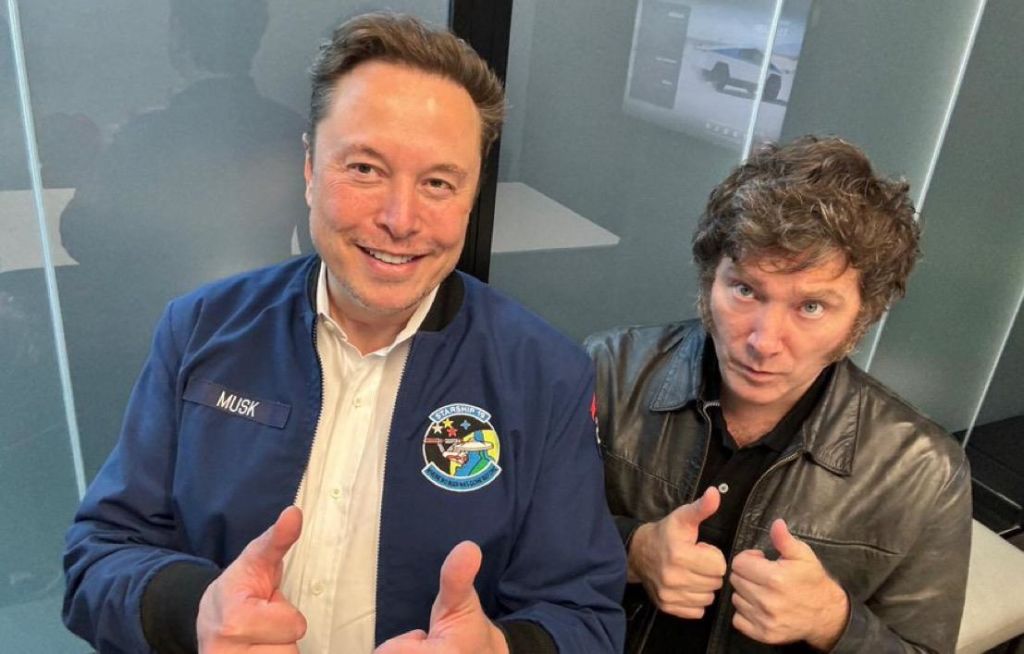‘You can’t live on a scorched earth.’ (Photo by Tomas Cuesta/Getty Images)

It is easy to mock Argentina’s president Javier Milei with his crazy hair, cloned dogs and claims of expertise at tantric sex. He was, after all, nicknamed El Loco (The Madman) as a teenage goalkeeper and seems often determined to perpetuate this reputation with his egotistical boasts and brutal attacks on critics. Yet, when this explosive character said recently he was one of the two most important politicians on this planet alongside Donald Trump, he might just turn out to be right.
For this self-styled “anarcho-capitalist”, who campaigned with a chainsaw as a symbol of his desire to slash the bloated state and free the economy, has embarked upon a messianic mission to salvage his stagnant nation. Carried unexpectedly to power on a wave of public contempt for failed politicians and a corrupt elite, Milei is trying to unleash a libertarian revolution in a statist society that one aide describes to me as “turbo-charged Thatcherism”.
His radical experiment is being watched closely around the world. Debt-laden governments are grappling with surging spending — not least in Washington, where Elon Musk has been tasked by Trump to perform similar surgery to their federal budget, and in Westminster where shattered Conservatives are searching for fresh ideas after ejection from office. Milei has responded with a typical lack of modesty, bragging that he is “exporting the model of the chainsaw and deregulation to the whole world”, while telling The Economist his contempt for the state remains “infinite” after his first year in office.
This mercurial loner, who once sang in a Rolling Stones covers band, is engaged in a high-risk gamble: to shake his country out of its decades-long stupor by slashing subsidies, sacking public servants, scrapping taxes, shutting ministries, ripping up regulations and privatising scores of state enterprises from airlines and banks through to football clubs and waterways. He has rattled his many foes, who often write him off as a political joke or a poisonous far-Right populist. But as he comes up to the first anniversary of his ascent to power, Milei can point to significant successes in curbing the curse of inflation and shrinking the state — although consumer spending has crashed, poverty has risen and growth remains elusive.

Sources close to the president tell me that whatever the outcome of his revolution, Milei believes it will offer valuable lessons for the world. “He might fail but he thinks the experience will be important and benefit others — not just in Argentina,” says one. At the very least, this unusual leader is proving to be a rare politician who keeps his word and does not hide from telling harsh truths. He warned people his medicine would be hard for them to swallow, insisting “there is no alternative to adjustment, there is no alternative to shock” in an inauguration speech that predicted “negative impact” on jobs, real wages and the number of people living below the breadline.
This prediction proved right as prices surged to the world’s highest annual inflation rate. Since then, his tough austerity measures have restrained further rises, reducing monthly inflation from 25% to 2.7% on latest data. The gap between the official dollar and the blue (illegal) dollar has fallen. A generous tax amnesty brought $20bn out from under mattresses into the formal economy. But Milei’s actions, including the firing of 30,000 federal workers — one in 10 of its staff — have also reduced consumption by one-fifth since he took power; beef sales in this steak-loving country, for instance, have fallen to their lowest levels for 13 years after a price-freeze ended. And more than half the 46m population are living in poverty, with the minimum wage plummeting almost one-third in a year.
Inevitably, Milei’s reforms sparked protests, especially over cuts to university funding and from people such as pensioners or teachers whose incomes fell. Yet remarkably, this leader of a country in its second year of recession has retained his popularity, and has the support of around half the electorate. One poll even indicated a slight rise in his ratings over the past month. Much of this backing comes from fed-up younger voters, who flocked last year to support him and his exuberantly populist message of change. “People are suffering but they know someone has to fix the mess,” said political scientist Sergio Berensztein. “He won because a large proportion of voters said enough is enough. We are a failed state that is over-spending.”
Critics, though, accuse him of ideologically pursuing a cruel experiment in “social Darwinism” in which only the strongest survive. “It works in books, it works in lessons but it does not work in the real world,” said one leading Argentinian banker when we met earlier this year in Buenos Aires. Yet even this man — worried about the lack of growth strategy to go with savaging the state — readily admitted there had been “some very good financial results” when we spoke again this week. And as he said, “the old system was rotten” with the nation living beyond its means and with incomes for ordinary people stagnating while a succession of corrupt leaders milked the system.
Milei’s path to victory was fuelled by scandals involving the Peronists who have long ruled Argentina. They left the country owing an an astonishing $263bn to creditors — yet the state’s size had doubled over two decades as Left-wing populists sought to buy popularity with costly subsidies and corrosive interventions such as price and rent controls. Cristina Kirchner, the powerful vice-president and former two-term president who followed her husband into office, was sentenced to six years in prison for stealing from state coffers in a massive fraud involving public works. Her sentence was upheld by a federal court last month following an appeal. Another political operative was jailed after being caught taking out cash at a bank using 48 debit cards for staff at a provincial legislature — and later found to have placed at least 20 family members and friends on the public payroll.
So this political caste relied on lies, patronage and printing of money was ousted by arguably the world’s first anarchist elected leader of a modern democracy — a man who sees taxes as a form of state coercion, is such a devout free marketeer that he supported the concept of trade in human organs, and has argued that the only true role for government should be defence and law-enforcement. While often called far-Right — or compared with Donald Trump and his combative populism — he is, in reality, an intellectual character who likes to spend two hours a day reading economic journals — and a libertarian, not an insular protectionist.

This wildly-eccentric yet fiercely-ideological politician knows how to attract attention. During his election campaign, Milei’s interview with Tucker Carlson received 300m views in 24 hours. Musk was among those sharing it on social media, saying it showed how “government overspending, which is the fundamental cause of inflation, has wrecked countless countries”. After his victory, Milei flew to Davos where he argued that the West was in danger from dark forces such as feminism, socialism and environmentalism putting its values in jeopardy from a vision “that inexorably leads to socialism and thereby to poverty”. Last month, the 54-year-old firebrand became the first foreign leader to visit Trump after his presidential victory — his attacks on the state, its political sinecures and power hubs have made him a hero among many US conservatives and members of the MAGA crowd.
But where did he come from?
The son of a bus firm boss, Milei alleges he was beaten and verbally abused by his parents. “They are dead to me,” he said later. “My father always told me that I was trash, that I was going to die of hunger and that I was going to be useless all my life.” His biographer claimed this treatment left him so embittered that other pupils at his Catholic school in Buenos Aires nicknamed him El Loco for his angry outbursts. He went on to play soccer in lower-level leagues, then worked as an economist at a bank and a conglomerate, but this forceful — some would say furious — nature led to prominence as a pundit on television, where he would launch savage attacks on the ruling “caste”.
His freewheeling discussions on everything from the perils of inflation through to the pleasures of sexual threesomes won him fame, followed by a seat in parliament three years ago, where he continued to show great skill at grabbing attention with stunts such as donating his salary to a monthly raffle giving “stolen” cash back to the people. His most trusted adviser is his younger sister, Karina, who stood by his side during those dark childhood days. She sold cakes on social media and communed as a medium with dead pets before using her public relations training to assist his campaign, then becoming his chief of staff. He adores his four pet Mastiffs, named after economists and cloned from his first dog called Conan, calling them his “little four-legged children” and once claiming to have telepathic conversations with Conan.
“When I hear him talking about the dogs and the idea that he is chosen by God I find this hard to take,” said one respected financial figure in Buenos Aires. “But he is an honest person and he is motivated to change Argentina.”
A government adviser described Milei to me a “very 21st-century politician” with his dishevelled image, insults and social media diatribes. “He has very direct communications with the people,” he said. “Remember just two years ago he was a crazy economist on TV. He’s also genuine — he says what he thinks and does what he says. He speaks his truth and made it clear he wants to adjust the economy.” This adviser added that he was very different in private. “He’s like a nice child — he’s very warm and does not appear egotistical. He is very willing to talk and listen. He is a much nicer personality than the public image: the lion calling everyone names.”
Another person who has known Milei for almost three decades said he used to be a conventional Keynesian economist until driven to his disruptive ideology a decade ago by the Kirchner’s mismanagement of Argentina. It is not hard to find voters who back his mission. “He is a madman but let’s see if he can make a difference,” said Jorge, serving me coffee in a small cafe in Buenos Aires. “I’ve worked hard all my life and have so little to show for it.” Jonathan Ezequiel, 33, one of the bicycle riders delivering food hailed by the president as being the vanguard of his vision of an unfettered economy, admitted he was struggling financially but saw the urgent need for change. “There was a lot of theft and corruption,” he said. “And a lot of money wasted on social plans for people who did not need them.”
Argentina — which had higher GDP per capita than France and Germany a century ago — should be as successful as its world-beating footballers, given its well-educated citizens, substantial energy resources and formidable agriculture. Instead, half its workers disappeared into the informal economy due to labour laws that Milei calls a “cancer”. There were 15 dollar exchange rates and import duties pushed up the prices of many goods — but subsidies drove down costs of cars. One analyst said this meant a fridge made in South Korea cost 10 times more in Argentina than in the US; another said this meant middle-class families such as his own could drive big cars which were subsidised by the poor. “This was not some kind of social democrat consensus,” he said. “It was opportunism, corruption and poor public policy.”
Peronist efforts to protect workers, restrain prices and fleece successful sectors such as agriculture prevented Argentina competing in the global market, resulting in some of the world’s lowest levels of trade as a percentage of GDP. The state payroll rose 10 times faster than the private sector over the past decade. One bus driver told me he failed to stop his daughters backing Milei due to their fury at the ñoqui — a derogatory nickname for officials who rarely turn up to work.
So can Milei salvage this nation? “I would give him a 40% chance of success,” said one well-placed observer. Although he has minimal current opposition — traditional parties were left shell-shocked and rudderless following his insurgency — the president’s coalition has little support in parliament and none among the 23 powerful provincial governors. He has never run anything in the past, loathes consensus, becomes easily embroiled in distracting culture wars and won power by railing against the political elite he needs to pass his reforms. Yet he has discovered the art of pragmatism in office, scaling down his pivotal “omnibus bill” after it was picked apart in Congress. “He has overachieved anybody’s expectations,” said one insider.
There have been stumbles. Milei embarrassingly signed a decree that included a 48% presidential pay rise soon after his accession, which he blamed on his predecessor after it was seized on by foes, then hastily ditched and sacked a minister. One ally — a former Peronist minister who defected and helped swing a key vote — was arrested last month in Paraguay after entering with $200,000 in undeclared cash. And there is anger among those who are losing out from his reforms — such as at one national scientific institute where staff were lined up in pouring rain outside their building to be told if they still had a job. “Perhaps we will have to emigrate, forced to do so by the destruction of science and public education,” said Natalia, 40, who works at the unit. “You cannot live on a scorched earth.”
Others rail against his weaponising of the culture wars and his direct appeal to angry young men frustrated by feminism. One of Milei’s first edicts was to end use of gender-neutral language in government and many of his young and liberal supporters loathe his anti-abortion stance and ambivalence over their nation’s military past. There are also fault-lines in his coalition between liberals and conservatives: he has already fallen out with his vice-president Victoria Villaruel, a hardline culture warrior whose father was an army colonel, to such an extent she no longer attends cabinet meetings.
Milei has launched a fascinating revolution — and as we have seen often in the past, such events are highly unpredictable. He knows he is likely to be judged on his economic success, especially his ability to curb inflation and kick-start growth — and that the most important weapon in his political arsenal is his personal appeal, based on despair, disenchantment and desperation for change that he has weaponised for an assault on the state and key power hubs of the Left.
Yet political popularity is a fragile beast, especially in a place scarred so badly by atrocious leaders. So he is engaged in a race against time: to prove to people that his remedies are right and the pain they suffer is worth enduring for the sake of their children and their nation’s future. The impact of this shock therapy will be watched intently around the world — and the waves could be felt far beyond Argentina.










Join the discussion
Join like minded readers that support our journalism by becoming a paid subscriber
To join the discussion in the comments, become a paid subscriber.
Join like minded readers that support our journalism, read unlimited articles and enjoy other subscriber-only benefits.
Subscribe